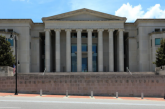

By Jenna Tooley
BRYAN, Ohio— In a significant legal development, an Ohio pastor, Chris Avell, is pursuing legal action against the city of Bryan, Ohio after facing 18 charges related to his efforts to provide shelter for homeless individuals. The case, which has garnered attention for its implications on humanitarian initiatives, reflects the broader challenges faced by those seeking to address homelessness.
The Dad’s Place church in Bryan, Ohio, led by Pastor Chris Avell, has filed a lawsuit against the city and its officials, accusing them of attempting to impede the exercise of religious beliefs. This occurred two weeks after the Pastor pled not guilty to the 18 zoning charges. The case, which involves allegations of zoning violations and fire code breaches, is being closely watched for its potential impact on religious freedom.
Pastor Chris Avell returned to his church on New Year’s Eve to find a police officer approaching him and notified him of the charges for violating the city’s zoning ordinance. The charges are linked to the church’s continuous operation and provision of shelter to homeless individuals. The legal dispute began when the city of Bryan issued a cease-and-desist letter to Dad’s Place, ordering it to stop housing people within 10 days, citing zoning laws.
In response to the charges, Dad’s Place church has taken legal action, filing a 43-page complaint in the U.S. District Court for Northern Ohio. The lawsuit accuses city officials of engaging in a harassment campaign to pressure the pastor into evicting homeless individuals from the church. The church argues that the city’s actions violate laws protecting religious institutions from discriminatory zoning practices.
Jeremy Dys, a lawyer with First Liberty Institute, representing Pastor Avell, emphasized the church’s commitment to its mission, stating, “This is what churches have done for centuries, millennia even.”
Bryan City Attorney Marc Fishel defended the city’s actions, stating that officials are enforcing laws that apply to all businesses and organizations. The city contends that, aside from zoning violations, the church breached fire codes, endangering lives. The fire chief reportedly found 18 violations, some of which were deemed serious safety concerns.
At a recent hearing, both parties agreed to maintain the status quo until at least March 4, when a judge will consider the church’s request for an injunction against the city. The lawsuit claims that the church’s religious mission involves providing shelter to those in need, emphasizing its commitment to caring for the vulnerable in the community.
According to reports, Pastor Avell’s legal team asserts that the charges are not only unwarranted but also run counter to the principles of compassion and social responsibility. Advocates argue that penalizing individuals who seek to provide relief to those experiencing homelessness contradicts the broader goals of community welfare and humanitarian efforts.
The legal dispute draws attention to the broader challenges faced by activists, community leaders, and religious figures who take it upon themselves to address critical social issues. As homelessness remains a persistent and pressing concern across the nation, the outcome of this case could set a precedent for how local jurisdictions balance the need for order with the imperative to address urgent humanitarian needs.
Legal experts anticipate that the case will prompt a thorough examination of existing local regulations governing the provision of shelter and support services for homeless individuals. The legal proceedings may also bring attention to potential gaps in the current legislative framework and foster discussions about the need for more comprehensive and compassionate approaches to homelessness.
Community members, religious congregations, and advocacy groups are closely monitoring the developments in Pastor Avell’s case, recognizing its potential impact on the ability of individuals and organizations to contribute meaningfully to solving one of society’s most pressing challenges. Pastor Avell states, “the eyes of the world, the country are on Bryan, Ohio”.
As the legal proceedings unfold, Pastor Avell’s case serves as a focal point for a broader conversation about the intersection of legality, compassion, and civic responsibility. The outcome of this legal battle may shape not only the pastor’s future but also the landscape of how communities engage with and address the critical issue of homelessness.
Legal experts suggest that the city must demonstrate a compelling public interest, such as fire safety, to justify restricting Dad’s Place from sheltering the homeless. The case raises questions about the balance between religious freedom and the application of zoning laws, with the church contending that it has diligently addressed safety concerns.
During a recent sermon, Pastor Avell reaffirmed the church’s commitment to keeping its doors open 24/7, emphasizing the Christian mission of providing respite to those in need. The legal battle is garnering attention as it unfolds, with implications for the broader conversation about the intersection of religious freedom and municipal regulations.




